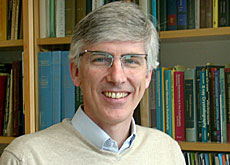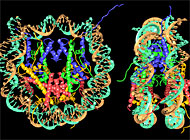Genetic genius scoops Swiss “Nobel” prize

Molecular biologist Professor Timothy Richmond has been awarded the Swiss equivalent of the Nobel prize for his work on unravelling genetic secrets.
Richmond, whose research could help find a treatment for hereditary illnesses, tells swissinfo about his pride at picking up Switzerland’s top scientific honour.
He was awarded the prestigious Marcel Benoist prize by research minister Pascal Couchepin at a ceremony on Friday. Couchepin praised the scientist’s work, saying it was “the result of many years of effort and yet…just a beginning”.
The United States-born scientist mapped out how nucleosomes, bundles of DNA and proteins that regulate gene activity, pass on information from which chromosomes of living cells are built.
Richmond hopes his work at the Federal Institute of Technology in Zurich will speed up understanding and possible cures for ailments caused by faulty gene activity.
swissinfo: What does it mean to you to win the Marcel Benoist prize?
Timothy Richmond: I thought this research might win a prize and it did when I won the Louis Jeantet prize in 2002. But I had forgotten about prizes since then so it really was quite a shock to win another.
It is a nice feeling to take my place among the best people who have done their work in Switzerland. It is nice to be appreciated at that level and it gives me a sense of satisfaction.
swissinfo: Can you explain the nature of your award-winning research?
T.R.: DNA encodes the information for life in all organisms and I thought it would be really nice to figure out what it looks like in higher cells – everything from fungi to humans.
We were able to determine the atomic structure of the first level of organisation in these cells, which is called a nucleosome. From this we can now learn something about how genetic information is transferred from generation to generation.
This is extremely fundamental research that is one step beyond discovering the DNA structure itself and that is why it is so popular with people and wins awards.
swissinfo: What practical applications could your research have in future?
T.R.: You can ask yourself if knowing the structure of DNA is important for curing diseases with medicine. That’s still controversial at the moment. People thought that once they had the secret of the human genome it would solve a lot of problems. It will, that’s clear, but it hasn’t done it quite yet – it’s in progress.
It’s not like I can say my research will cure diseases X,Y and Z. All I can say is that it is so fundamental that it is undoubtedly going to affect the way people think about how to solve those kinds of problems.
We are talking about mostly hereditary genetic disease. I know it will be valuable but I don’t know exactly how yet.
swissinfo: What do you say to people who are morally opposed to genetic research?
T.R.: The knowledge we gain from this type of research will make us fitter for survival, fitter for fulfilment in life and will prevent nasty things happening to us in terms of health.
I’m not talking about redesigning life, I just want to know how it works and if it malfunctions maybe someone can make use of what I have learned to remedy the situation.
swissinfo: Why did you come to Switzerland 20 years ago?
T.R.: On the personal side, I like adventure and Switzerland seemed to offer that because it is a multi-cultural society in the heart of Europe.
Scientifically, I knew the problems I was working on could take a while and I could have setbacks along the way. The Federal Institute had mechanisms to keep us supported even if things were not going well.
The idea that you can go on a little bit longer when elsewhere you might have your resources cut out from under you made it a very attractive place to come.
swissinfo-interview: Matthew Allen in Zurich
Timothy Richmond has been Professor of the X-ray Crystallography of Biological Macromolecules at the Federal Institute of Technology in Zurich since 1987.
Richmond has dedicated the past 20 years to the task of explaining the exact atomic structure of the nucleosome.
The Marcel Benoist Prize has been awarded since 1920 and is regarded as the “Swiss Nobel Prize”. The prize is worth SFr100,000 ($80,000). It is awarded by the interior minister, currently Pascal Couchepin.
The Marcel Benoist Foundation was established by the will of the French lawyer Marcel Benoist, a resident of Lausanne, who died in 1918. It is managed by a group of trustees comprising Swiss ministers and heads of the main Swiss universities.

In compliance with the JTI standards
More: SWI swissinfo.ch certified by the Journalism Trust Initiative


You can find an overview of ongoing debates with our journalists here. Please join us!
If you want to start a conversation about a topic raised in this article or want to report factual errors, email us at english@swissinfo.ch.